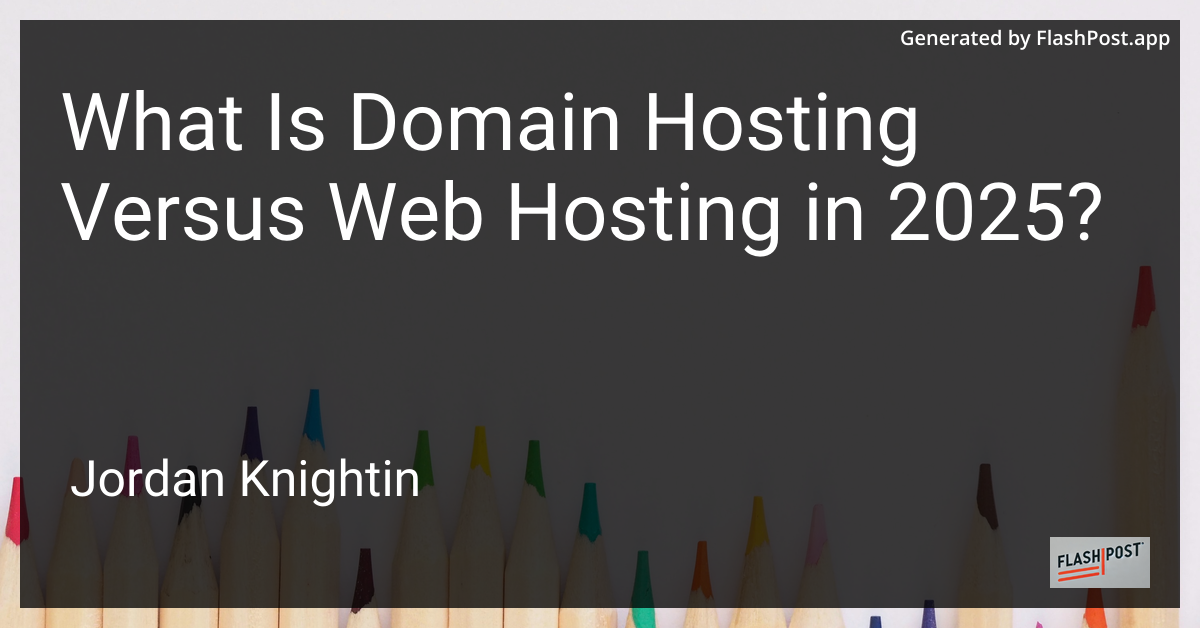

What Is Domain Hosting Versus Web Hosting in 2025?
In today’s digital era, establishing an online presence is pivotal for businesses and individuals alike. Whether you’re setting up an e-commerce store, a blog, or a portfolio website, understanding the nuances of domain hosting and web hosting is crucial. By 2025, the landscape of hosting services has evolved significantly, reflecting the growing demands and technological advancements of the internet. This article demystifies the key differences between domain hosting and web hosting, helping you make informed decisions for your online ventures.
What is Domain Hosting?
Domain hosting, often confused with domain registration, involves renting a domain name, which serves as your website’s address on the internet. Think of it as owning a piece of digital real estate. Domain hosting ensures that your chosen domain name (like www.yourwebsite.com) remains reserved and points to your website.
How Domain Hosting Works:
- Domain Registration: You begin by selecting and registering a unique domain name through a registrar.
- DNS Configuration: Once registered, the domain name system (DNS) converts the domain name into an IP address, directing visitors to the correct server and website files.
- Renewal and Management: Domain hosts manage the renewal of domain registrations, ensuring your domain remains active.
What is Web Hosting?
Web hosting, in contrast, involves renting server space where your website files are stored. Simply put, it’s the physical location of your website. Without web hosting, your website cannot exist on the internet.
Types of Web Hosting in 2025:
- Shared Hosting: Involves sharing server resources with multiple websites. It’s cost-effective, making it ideal for small websites or beginners.
- VPS Hosting: Virtual Private Server hosting offers dedicated resources within a shared server environment, providing better performance and control.
- Dedicated Hosting: Offers an entire server dedicated to your website, ensuring robust performance and security, ideal for large businesses.
- Cloud Hosting: Utilizes multiple servers to host websites, ensuring reliability and scalability.
- Managed WordPress Hosting: Specialized hosting optimized for WordPress sites, handling updates and backups.
Key Differences Between Domain Hosting and Web Hosting
- Functionality: Domain hosting involves registering and managing your domain name, while web hosting involves storing your website’s files and making them accessible online.
- Cost: Domain names are typically billed annually, whereas web hosting can be billed monthly or annually depending on the host and plan.
- Providers: Many companies offer both services, but they can also be purchased separately from different providers.
Choosing the Right Hosting in 2025
When choosing hosting services, consider your website’s needs, such as the expected traffic, size, and technical requirements. Here are some expert-recommended resources for specific needs:
- Top Hosting Providers for WooCommerce - Ideal for e-commerce platforms.
- Top Hosting Providers for OpenCart - Focused on serving OpenCart-powered websites.
- Top Node.js Hosting Providers - Perfect for developers working with Node.js applications.
In conclusion, while domain hosting ensures you have a unique online identity, web hosting enables your website’s operation and accessibility. Both are integral, yet distinct components in building a successful online presence in 2025. By understanding their distinctions and functions, you can make informed decisions that align with your online ambitions.
